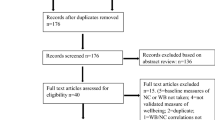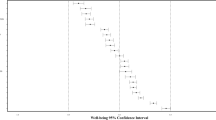Abstract
There is a well-known association between religion and happiness, although it is not known which particular aspects of religiosity correlate with life satisfaction, or if the correlates are different for people of different religions. In three studies, the correlations of different facets of religiosity with happiness or life satisfaction were explored. In different samples and with different measures, congregational support and public practice of religion appear to correlate similarly with measures of life satisfaction for members of different religions. However, spirituality, religious coping, and religious belief were better predictors of happiness and quality of life for Protestants and Catholics than for Jews. It is therefore contended that religion should be an important consideration, along with religiosity, in study of satisfaction with life, and that the link between spirituality and life satisfaction be followed up, particularly among Christians.
Similar content being viewed by others
REFERENCES
Abramowitz, J., J. Huppert, A.B. Cohen, S.P. Cahill and D.F. Tolin: 2002, ‘Religious obsessions and compulsions in a non-clinical sample: The Penn Inventory of Scrupulosity’, Behaviour Research and Therapy 40, pp. 825–838.
Andrews, F.M. and J.P. Robinson: 1991, ‘Measures of subjective well-being’, in J.P. Robinson, P.R. Shaver and L.S. Wrightsman (eds.), Measures of Personality and Social Psychological Attitudes, vol. 1 (Academic Press, San Diego), pp. 61–114.
Appel, G.: 1975, A Philosophy of Mitzvot: The Religious–Ethical Concepts of Judaism, their Roots in Biblical Law and the Oral Tradition (Ktav, New York).
Argyle, M.: 1999, ‘Causes and correlates of happiness’, in D. Kahneman, E. Diener and N. Schwarz (eds.), Well-being: The Foundations of Hedonic Psychology (Russell Sage Foundation, New York), pp. 353–373.
Argyle, M. and B. Beit-Hallahmi: 1997, The Psychology of Religious Behaviour, Belief and Experience (Routledge, London).
Berger, P.L.: 1967, The Sacred Canopy: Elements of a Sociological Theory of Religion (Anchor Books, New York).
Birnbaum, M.H. (ed.): 2000, Psychological Experiments on the Internet (Academic Press, San Diego).
Cohen, A.B. and P. Rozin: 2001, ‘Religion and the morality of mentality’, Journal of Personality and Social Psychology 81, pp. 697–710.
Cohen, A.B., J.I. Siegel and P. Rozin: 2001, ‘Faith versus practice: Different bases for religiosity judgments by Jews and Protestants’, European Journal of Social Psychology (in press).
Dubow, E.F., K.I. Pargament, P. Boxer and N. Tarakeshwar: 2000, ‘Initial investigation of Jewish early adolescents’ ethnic identity, stress, and coping’, Journal of Early Adolescence 20, pp. 418–441.
Goldberg, L.R.: 1999, ‘A broad-bandwidth, public-domain, personality inventory measuring the lower-level facets of several five-factor models’, in I. Mervielde, I. Deary, F. De Fruyt and F. Ostendorf (eds.), Personality Psychology in Europe, vol.7 (Tilburg University Press, Tilburg, The Netherlands), pp. 7–28.
Guth, J.L., J.C. Green, C.E. Smidt, L.A. Kellstedt and M.M. Poloma: 1997, The Bully Pulpit: The Politics of Protestant Clergy (University Press of Kansas, Lawrence, KS).
Haidt, J.: in press, ‘Elevation and the positive psychology of morality’, in C.L.M. Keyes and J. Haidt (eds.), Flourishing: The Positive Person and the Good Life (American Psychological Association, Washington DC).
Haidt, J. and D. Keltner: in press, ‘Awe/responsiveness to beauty and excellence’, in C. Peterson and M.E.P. Seligman (eds.), The VIA Taxonomy of Strengths (Valves in Action Institute, Cincinnati, OH).
Hill, P.C., K.I. Pargament, R.W. Hood, M.E. McCullough, J.P. Swyers and D. Larson: 2000, ‘Conceptualizing religion and spirituality: Points of commonality, points of departure’, Journal for the Theory of Social Behaviour 30, pp. 51–77.
James, W.: 1997/1902, Varieties of Religious Experience (Simon & Schuster, New York).
Janoff-Bullman, R.: 1992, Shattered Assumptions: Towards a New Psychology of Trauma (Free Press, New York).
Keltner, D. and J. Haidt: in press, ‘Approaching awe, a moral, spiritual, and aesthetic emotion’, Cognition and Emotion.
Koenig, H.G., M.E. McCullough and D.B. Larson: 2001, Handbook of Religion and Health (Oxford University Press, Oxford).
Levin, J.S. and L.M. Chatters: 1998, ‘Research on religion and mental health: An overview of empirical findings and theoretical issues’, in H.G. Koenig (ed.), Handbook of Religion and Mental Health (Academic Press, San Diego), pp. 33–50.
Maimonides, M.: 12th century/1967, Mishneh Torah (Hebrew Publishing Company, New York).
Marty, M.: 1970, Religious Empire: The Protestant Experience in America (Dial Press, New York).
McCullough, M.E., R.A. Emmons and J.-A. Tsang: 2002, ‘The grateful disposition: A conceptual and empirical topography’, Journal of Personality and Social Psychology 82, pp. 112–127.
Morris, P.: 1996, ‘Community beyond tradition’, in P. Heelas, S. Lash and P. Morris (eds.), Detraditionalization: Critical Reflections on Authority and Identity (Blackwell, Cambridge), pp. 222–249.
Musick, M.A., J.W. Traphagan, H.G. Koenig and D.B. Larson: 2000, ‘Spirituality in physical health and aging’, Journal of Adult Development 7(2), pp. 73–86.
Myers, D.G. and E. Diener: 1995, ‘Who is happy?’ Psychological Science 6(1), pp. 10–19.
Myers, D.: 1992, Pursuit of Happiness: Discovering the Pathway to Fulfillment, Well-being, and Enduring Personal Joy (Avon, New York).
Neusner, J.: 1993, ‘Judaism’, in A. Sharma (ed.), Our Religions (HarperSanFrancisco, San Francisco), pp. 293–355.
Pargament, K.I.: 1997, The Psychology of Religion and Coping (Guilford Press, New York).
Pargament, K.I. and C.R. Brant: 1998, ‘Religion and coping’, in H.G. Koenig(ed.), Handbook of Religion and Mental Health (Academic Press, San Diego), pp. 111–128.
Pargament, K.I., R.E. Steele and F.B. Tyler: 1979, ‘Religious participation, religious motivation and individual psychosocial competence’, Journal for the Scientific Study of Religion 18, pp. 412–419.
Park, C.L. and S. Folkman: 1997, ‘Meaning in the context of stress and coping’, Review of General Psychology 1, pp. 115–144.
Pavot, W. and E. Diener: 1993, ‘Review of the Satisfaction with Life Scale’, Psychological Assessment 5, pp. 164–172.
Prager, D. and J. Telushkin: 1981, Nine Questions People Ask about Judaism (Simon & Schuster, New York).
Schechter, S.: 1908/1958, Studies in Judaism: Essays on Persons, Concepts, and Movements of Thought in Jewish Tradition (Jewish Publication Society, New York).
Scheier, M.F. and C.S Carver: 1985, ‘Optimism, coping, and health: Assessment and implications of generalized outcome expectancies’, Health Psychology 4(3), pp. 219–247.
Telushkin, J.: 1991, Jewish Literacy: The Most Important Things to Know About the Jewish Religion, its People, and its History (William Morrow and Company, New York).
Zedek, M.R.: 1998, ‘Religion and mental health from the Jewish perspective’, in H.G. Koenig (ed.), Handbook of Religion and Mental Health (Academic Press, San Diego), pp. 255–261.
Zinnbauer, B.J., K.I. Pargament and A.B. Scott: 1999, ‘The emerging meanings of religiousness and spirituality: Problems and prospects’, Journal of Personality 67(6), pp. 889–919.
Author information
Authors and Affiliations
Corresponding author
Rights and permissions
About this article
Cite this article
Cohen, A.B. The Importance of Spirituality in Well-Being for Jews and Christians. Journal of Happiness Studies 3, 287–310 (2002). https://doi.org/10.1023/A:1020656823365
Issue Date:
DOI: https://doi.org/10.1023/A:1020656823365




